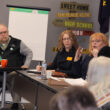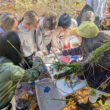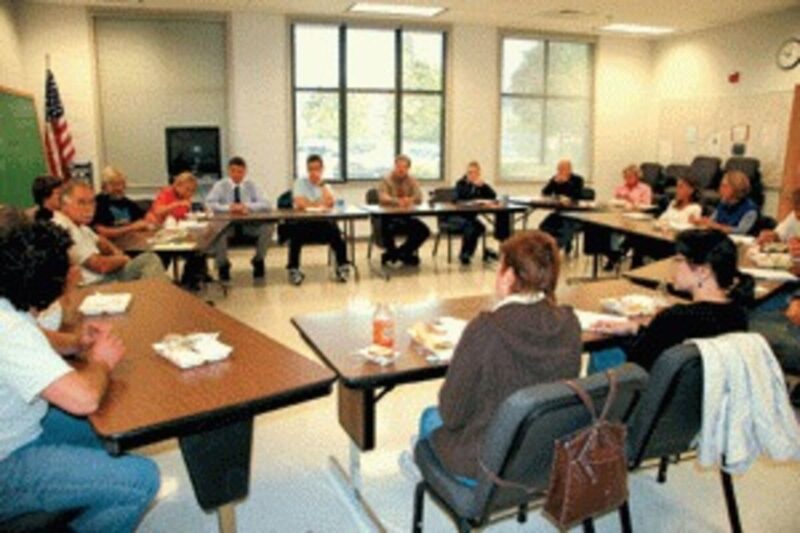Scott Swanson
Of The New Era
What happens to a rural community when critical natural resources can no longer be utilized and prosperity is replaced by poverty?
That question, along with a variety of corollaries, brought a dozen Oregon State University graduate students and three professors to Sweet Home. They spent part of last week walking about town and talking with community leaders as part of a graduate seminar entitled “Communities and Natural Resources.”
The students had dinner at Mollies Bakery Wednesday with community leaders Mayor Craig Fentiman, City Manager Craig Martin, Councilman Dick Hill, former City Council members Bob and Mona Waibel, and Chamber of Commerce Board member Lorena Ruby.
The seminar is led by OSU Forestry Resources professor John Bliss, OSU Human Development and Family Science professor Kate MacTavish, who has been studying life in local mobilehome parks for the past few years, and Nils Christoffersen of Wallowa Resources in Enterprise. Students in the class are from a wide variety of majors – anthropology, public policy, public health, human development and family science and forestry.
“We’re looking at environmental issues, health, poverty,” said Michael Foland, who is working toward a degree in public health.
“We’re trying to take a global look at how communities are affected by public policy decisions.”
On Wednesday, students toured the Weyerhaeuser plywood mill in Foster, visited a trailer court and walked around town before their dinner at Mollies.
Mona Waibel reviewed some of the history of the area and Fentiman discussed the city’s problems with deteriorating infrastructure, which are forcing it to build a new water treatment plant, and the changing demographics brought on by new housing construction – particularly, developments along the Santiam River.
He recalled how the community responded after the logging industry collapsed.
When the timber industry “died,” he said, he and other community leaders “rode buses” to Portland and elsewhere to testify at meetings on the issues resulting from the collapse.
Hill, who also heads the Sweet Home Emergency Ministries, talked about the volunteerism in the community and how that has contributed to SHEM, the Boys and Girls Club, the Friends of the Library bookstore, and many other community efforts.
In particular, Hill said, volunteerism has enabled SHEM to help the impoverished.
“People just respond,” he said. “It’s a family-type community. The volunteerism here is unbelievable. I’ve never seen a town help each other so much.”
Fentiman agreed.
“If you come into town for any length of time, it’s like a disease. It’s catching,” he said.
On Thursday students met with school officials and students at the high school, then took a tour of Mike Melcher’s logging and development businesses.
The two-week seminar then moved on to Sisters, Bend and Madras, and is visiting Wallowa County before returning to Corvallis Thursday, Sept. 21 to wrap things up.
Students came away with a variety of impressions from their Sweet Home experience.
Cliff Ham, 53, who is working toward a master’s degree in public policy in the Rural Studies Department, used to be a logging industry worker himself. He said his goal is to help people like himself find new employment that will enable them to maintain a middle-class standard of living.
“There’s a diversity of viewpoints,” he said of his experience in Sweet Home. “Talking to people on the street versus talking to people who are making the decisions, people of service, their perception of the problems don’t seem to coincide.”
Ham said the two major problems he sees in Sweet Home are unemployment and drugs.
“That’s nothing new in a timber-dependent community,” he said. “It’s a recurrent theme – jobs being outsourced or people being replaced by machines. The Douglas fir is going out of the country on barges.”
Ham said he also understands the “generational nature of undereducation” in communities such as Sweet Home.
“As a displaced timber worker, it never
occurred to me that I would need education,” he said. “I did just fine until I lost my job.”
Shiloh Sundstrom, 24, who is studying forest resources with an interest in rural sustainability, grew up in Deadwood, near Mapleton.
He said the chance to study communities such as Sweet Home “is a neat thing for me, having been in Oregon my whole life.”
Sundstrom said he was particularly impressed by the schools’ ability to “offer a good education and lots of programs” despite laws such as Measure 5 and the collapse of the timber industry.
He said he sees Sweet Home as being “relatively open towards change.
“They’re open to new development, houses are going in – the change that’s going to happen,” Sundstrom said.
The other thing that impresses him, he said, is the community’s will.
“Even though the mills aren’t around any more and the timber industry is down, people are still making a living logging,” he said. “That will always be a part of this community. People are still making a living using natural resources.”
Sera Janson, a natural resources/social sciences student, said she sees education as a key to strengthening a community and thinks Sweet Home needs educators among its city leaders, especially on the City Council.
“Communities should support educators and listen to educators, because an educational system will provide a sustainable future for the community,” she said.
“My biggest thing I’m seeing here is people who aren’t looking to the future,” Janson said. “They’re caught up in ‘my space and my time’ and if they’re not thinking about the future, they’re going to have to play defense in the game of life.”
She noted that asked a business owner in town whether they were developing a younger person to take over the business when they were through and the answer was “No.”
“I like to see communities be more proactive in looking to the future,” she said. “Training someone to go behind you.”





